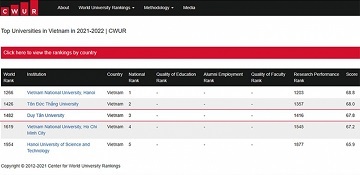
For HCMC Open University, 2006 marked a milestone in the school’s digital transformation, when it began organizing credit-based study, allowing students to register for subjects online. The management of classes, study schedules, timetables and student information was updated into a general information system.
Ten years later, in 2016, the online bachelor’s degree training program was officially launched. In 2019, the school began a blended training mode, applied to full-time students. In 2021, the school built VMOOCs (Vietnam Massive Open Online Courses) which provides online training courses for free.
Digital transformation began at Van Lang University in 2008, when it cooperated with Carnegie Mellon University. At that time, lecturers had to use a module system to upload documents and exchange information with students.
However, Tran Thi My Dieu, Vang Lang University Rector, said she still dared not give answers to questions whether Van Lang was really a digital school.
“It was just digitizing what can be digitized. In this period, everything was digitized to be managed in the system. Everyone can connect each other, online or offline,” Dieu explained.
The HCMC University of Technology and Education started its digital transformation in 2013, when it received a learning management system (LMS) from ASU (Arizona State University) in the US.
At that time, only 17 ‘nucleus’ lecturers of the school were trained by ASU experts. Now, it has 91 million learning interactions on the school’s digital teaching platform each year.
UTEx is the first state-owned online university in Vietnam. Equipped with modern facilities, it uses an ecosystem of management software such as KPIs, E-Portfolio and Dashboard.
It also uses social media and UTE-TV channel to connect businesses and former students for support in training, career guidance, digital marketing and enrollment consulting.
Human resources are key
| Human resources are the key factor for digital transformation. Making investment in human resources means providing an environment for lecturers to prepare lesson plans online but also helping them upgrade their teaching methods and improve their capability. |
Twenty years ago, digital education was still a vague concept, but now it is a clear trend.
Tung said that Hanoi Open University has upgraded the technological infrastructure with three modern studios, two content development rooms, seven servers with network equipment, 18 technology rooms with more than 100 tablets, professional cameras, and nearly 500 high-configuration computers at study locations. The system cost $5 million.
Pham Quang Dung from the Vietnam National University of Agriculture estimates that the cost for one school to shift to a smart school model is 60 percent higher than a traditional school. Money is spent mostly on hardware, software, technology, smart classrooms, pedagogical activities, student management, lecturers and smart teaching programs.
Dung hopes that commercialization of research works during the transformation process will bring money for reinvestment. It is expected that investment capital can be recovered within 10 years.
Declining to reveal the exact figure, Nguyen Minh Ha, rector of the HCMC Open University, said the initial investment capital was ‘extremely high’.
Dieu said: “If you ask if it is costly to carry out a digital transformation, I would say ‘yes’. But if you ask if schools need a lot of money to implement the process, I would say ‘no’”.
According to Dieu, human resources are the key factor for digital transformation. Making investment in human resources means providing an environment for lecturers to prepare lesson plans online but also helping them upgrade their teaching methods and improve their capability.
“If we have a strong platform worth multi-billions of dong and a good connection system but our staff remains unchanged, we won’t be able to become a smart university,” she said.
The most difficult issue is to encourage the large community of lecturers to be aware of the need for innovation to reach a better future with more optimal solutions.
Ngan Anh

Five Vietnamese universities make World University Rankings
A total of five local universities have been named among the global list of the world’s top 2,000 universities for the 2021 to 2022 edition, as released by the Center of World University Rankings (CWUR).

Vietnam needs strategy for digital transformation in education sector
The success of digital transformation in the education sector will make an important contribution to the formation of a digital nation.
